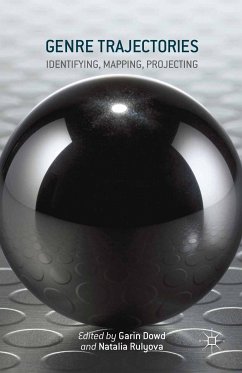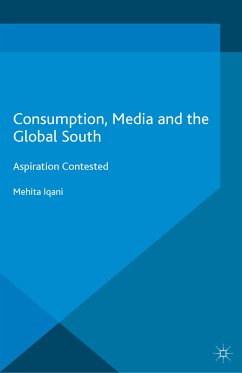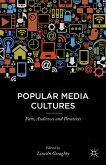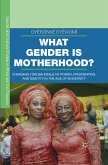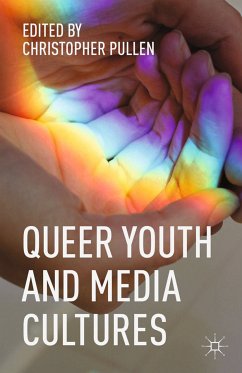Genre Trajectories (eBook, PDF)
Identifying, Mapping, Projecting
Redaktion: Dowd, Garin; Rulyova, Natalia
40,95 €
40,95 €
inkl. MwSt.
Sofort per Download lieferbar

20 °P sammeln
40,95 €
Als Download kaufen

40,95 €
inkl. MwSt.
Sofort per Download lieferbar

20 °P sammeln
Jetzt verschenken
Alle Infos zum eBook verschenken
40,95 €
inkl. MwSt.
Sofort per Download lieferbar
Alle Infos zum eBook verschenken

20 °P sammeln
Genre Trajectories (eBook, PDF)
Identifying, Mapping, Projecting
Redaktion: Dowd, Garin; Rulyova, Natalia
- Format: PDF
- Merkliste
- Auf die Merkliste
- Bewerten Bewerten
- Teilen
- Produkt teilen
- Produkterinnerung
- Produkterinnerung

Bitte loggen Sie sich zunächst in Ihr Kundenkonto ein oder registrieren Sie sich bei
bücher.de, um das eBook-Abo tolino select nutzen zu können.
Hier können Sie sich einloggen
Hier können Sie sich einloggen
Sie sind bereits eingeloggt. Klicken Sie auf 2. tolino select Abo, um fortzufahren.

Bitte loggen Sie sich zunächst in Ihr Kundenkonto ein oder registrieren Sie sich bei bücher.de, um das eBook-Abo tolino select nutzen zu können.
This book provides a fresh interdisciplinary perspective on genre and identifies developments in genre studies in the early 21st century. Genre approaches are applied to examine a fascinating range of texts including ancient Greek poems, Holocaust visual and literary texts, contemporary Hollywood films, selfies, melodrama, and classroom practices.
- Geräte: PC
- ohne Kopierschutz
- eBook Hilfe
- Größe: 1.45MB
Andere Kunden interessierten sich auch für
![Consumption, Media and the Global South (eBook, PDF) Consumption, Media and the Global South (eBook, PDF)]() Mehita IqaniConsumption, Media and the Global South (eBook, PDF)40,95 €
Mehita IqaniConsumption, Media and the Global South (eBook, PDF)40,95 €![Popular Media Cultures (eBook, PDF) Popular Media Cultures (eBook, PDF)]() Popular Media Cultures (eBook, PDF)40,95 €
Popular Media Cultures (eBook, PDF)40,95 €![What Gender is Motherhood? (eBook, PDF) What Gender is Motherhood? (eBook, PDF)]() Oyèrónk¿´ OyewùmíWhat Gender is Motherhood? (eBook, PDF)30,95 €
Oyèrónk¿´ OyewùmíWhat Gender is Motherhood? (eBook, PDF)30,95 €![Sociology in Austria since 1945 (eBook, PDF) Sociology in Austria since 1945 (eBook, PDF)]() C. FleckSociology in Austria since 1945 (eBook, PDF)40,95 €
C. FleckSociology in Austria since 1945 (eBook, PDF)40,95 €![Latin America at Fin-de-Siècle Universal Exhibitions (eBook, PDF) Latin America at Fin-de-Siècle Universal Exhibitions (eBook, PDF)]() Alejandra UslenghiLatin America at Fin-de-Siècle Universal Exhibitions (eBook, PDF)73,95 €
Alejandra UslenghiLatin America at Fin-de-Siècle Universal Exhibitions (eBook, PDF)73,95 €- -51%11
![Intergenerationelle Erinnerung in der Schweiz (eBook, PDF) Intergenerationelle Erinnerung in der Schweiz (eBook, PDF)]() Nicole BurgermeisterIntergenerationelle Erinnerung in der Schweiz (eBook, PDF)26,96 €
Nicole BurgermeisterIntergenerationelle Erinnerung in der Schweiz (eBook, PDF)26,96 € ![Queer Youth and Media Cultures (eBook, PDF) Queer Youth and Media Cultures (eBook, PDF)]() Christopher PullenQueer Youth and Media Cultures (eBook, PDF)73,95 €
Christopher PullenQueer Youth and Media Cultures (eBook, PDF)73,95 €-
-
-
This book provides a fresh interdisciplinary perspective on genre and identifies developments in genre studies in the early 21st century. Genre approaches are applied to examine a fascinating range of texts including ancient Greek poems, Holocaust visual and literary texts, contemporary Hollywood films, selfies, melodrama, and classroom practices.
Dieser Download kann aus rechtlichen Gründen nur mit Rechnungsadresse in A, B, BG, CY, CZ, D, DK, EW, E, FIN, F, GR, HR, H, IRL, I, LT, L, LR, M, NL, PL, P, R, S, SLO, SK ausgeliefert werden.
Produktdetails
- Produktdetails
- Verlag: Palgrave Macmillan UK
- Seitenzahl: 255
- Erscheinungstermin: 25. August 2015
- Englisch
- ISBN-13: 9781137505484
- Artikelnr.: 43973371
- Verlag: Palgrave Macmillan UK
- Seitenzahl: 255
- Erscheinungstermin: 25. August 2015
- Englisch
- ISBN-13: 9781137505484
- Artikelnr.: 43973371
- Herstellerkennzeichnung Die Herstellerinformationen sind derzeit nicht verfügbar.
Natasha Artemeva, Carleton University, Canada Peter Buse, Kingston University, London, UK Béatrice Damamme-Gilbert, University of Birmingham, UK Katya Krylova, University of Nottingham, UK Donald N. Myles, Carleton University, Canada Timothy S. Murphy, Oklahoma State University, USA Sarah Parker, University of Stirling, UK Anne Smedegaard, University of Copenhagen, Denmark Erin K. Stapleton, University of Melbourne, Australia Lesley Stevenson, Independent Scholar Michael Stewart, Queen Margaret University, Edinburgh, UK Michael Volek, Athabasca University, Canada
PART I: RE-ASSESSING THEORETICAL TRADITIONS: FROM ANCIENT GREECE TO BAKHTIN
1. Philosophy ' 's Broken Mirror: Genre Theory and the Strange Place of Poetry from Plato to Badiou; Garin Dowd
2. Remembering to Forget: the Role of Time, Space and Memory in Mikhail Bakhtin ' 's Treatment of Language; Michael Volek
PART II: MEMORY, TESTIMONY, POLITICS
3. The Question of Genre in Holocaust Narrative: The Case of Patrick Modiano ' 's Dora Bruder (1997); Béatrice Damamme-Gilbert
4. Genre and Memory in Margareta Heinrich ' 's and Eduard Erne ' 's Totschweigen (1994) and Elfriede Jelinek ' 's Rechnitz (Der Würgeengel) (2008); Katya Krylova
PART III: REVISITING LITERARY GENRES: WRITING BACK/WRITING FORWARD
5. The Muse Writes Back: Lyric Poetry and Female Poetic Identity; Sarah Parker
6. How (Not) to Translate an Unidentified Narrative Object or a New Italian Epic; Timothy S. Murphy
PART IV: VISUAL CULTURES: TECHNOLOGIES, INSTITUTIONS AND GENRES
7. Seduced by Art: the Problem of Photography; Lesley Stevenson
8. Vernacular Photographic Genres after the Camera Phone; Peter Buse
PART V: FILM GENRES: ENDURANCE AND TRANSFORMATION
9. The Enduring Reach of Melodrama in Contemporary Film and Culture; Michael Stewart
10. Objects after Adolescence: Teen Film with Transition in Spring Breakers and The Bling Ring; Erin K. Stapleton
PART VI: PEDAGOGIES: APPLICATIONS IN EDUCATION
11. Student and Teacher Constructions of the ' 'Generic Contract ' ' in High School Essays; Anne Smedegaard
12. Perceptions of Prior Genre Knowledge: A Case of Incipient Biliterate Writers in the EAP Classroom; Natasha Artemeva and Donald N. Myles
1. Philosophy ' 's Broken Mirror: Genre Theory and the Strange Place of Poetry from Plato to Badiou; Garin Dowd
2. Remembering to Forget: the Role of Time, Space and Memory in Mikhail Bakhtin ' 's Treatment of Language; Michael Volek
PART II: MEMORY, TESTIMONY, POLITICS
3. The Question of Genre in Holocaust Narrative: The Case of Patrick Modiano ' 's Dora Bruder (1997); Béatrice Damamme-Gilbert
4. Genre and Memory in Margareta Heinrich ' 's and Eduard Erne ' 's Totschweigen (1994) and Elfriede Jelinek ' 's Rechnitz (Der Würgeengel) (2008); Katya Krylova
PART III: REVISITING LITERARY GENRES: WRITING BACK/WRITING FORWARD
5. The Muse Writes Back: Lyric Poetry and Female Poetic Identity; Sarah Parker
6. How (Not) to Translate an Unidentified Narrative Object or a New Italian Epic; Timothy S. Murphy
PART IV: VISUAL CULTURES: TECHNOLOGIES, INSTITUTIONS AND GENRES
7. Seduced by Art: the Problem of Photography; Lesley Stevenson
8. Vernacular Photographic Genres after the Camera Phone; Peter Buse
PART V: FILM GENRES: ENDURANCE AND TRANSFORMATION
9. The Enduring Reach of Melodrama in Contemporary Film and Culture; Michael Stewart
10. Objects after Adolescence: Teen Film with Transition in Spring Breakers and The Bling Ring; Erin K. Stapleton
PART VI: PEDAGOGIES: APPLICATIONS IN EDUCATION
11. Student and Teacher Constructions of the ' 'Generic Contract ' ' in High School Essays; Anne Smedegaard
12. Perceptions of Prior Genre Knowledge: A Case of Incipient Biliterate Writers in the EAP Classroom; Natasha Artemeva and Donald N. Myles
PART I: RE-ASSESSING THEORETICAL TRADITIONS: FROM ANCIENT GREECE TO BAKHTIN
1. Philosophy ' 's Broken Mirror: Genre Theory and the Strange Place of Poetry from Plato to Badiou; Garin Dowd
2. Remembering to Forget: the Role of Time, Space and Memory in Mikhail Bakhtin ' 's Treatment of Language; Michael Volek
PART II: MEMORY, TESTIMONY, POLITICS
3. The Question of Genre in Holocaust Narrative: The Case of Patrick Modiano ' 's Dora Bruder (1997); Béatrice Damamme-Gilbert
4. Genre and Memory in Margareta Heinrich ' 's and Eduard Erne ' 's Totschweigen (1994) and Elfriede Jelinek ' 's Rechnitz (Der Würgeengel) (2008); Katya Krylova
PART III: REVISITING LITERARY GENRES: WRITING BACK/WRITING FORWARD
5. The Muse Writes Back: Lyric Poetry and Female Poetic Identity; Sarah Parker
6. How (Not) to Translate an Unidentified Narrative Object or a New Italian Epic; Timothy S. Murphy
PART IV: VISUAL CULTURES: TECHNOLOGIES, INSTITUTIONS AND GENRES
7. Seduced by Art: the Problem of Photography; Lesley Stevenson
8. Vernacular Photographic Genres after the Camera Phone; Peter Buse
PART V: FILM GENRES: ENDURANCE AND TRANSFORMATION
9. The Enduring Reach of Melodrama in Contemporary Film and Culture; Michael Stewart
10. Objects after Adolescence: Teen Film with Transition in Spring Breakers and The Bling Ring; Erin K. Stapleton
PART VI: PEDAGOGIES: APPLICATIONS IN EDUCATION
11. Student and Teacher Constructions of the ' 'Generic Contract ' ' in High School Essays; Anne Smedegaard
12. Perceptions of Prior Genre Knowledge: A Case of Incipient Biliterate Writers in the EAP Classroom; Natasha Artemeva and Donald N. Myles
1. Philosophy ' 's Broken Mirror: Genre Theory and the Strange Place of Poetry from Plato to Badiou; Garin Dowd
2. Remembering to Forget: the Role of Time, Space and Memory in Mikhail Bakhtin ' 's Treatment of Language; Michael Volek
PART II: MEMORY, TESTIMONY, POLITICS
3. The Question of Genre in Holocaust Narrative: The Case of Patrick Modiano ' 's Dora Bruder (1997); Béatrice Damamme-Gilbert
4. Genre and Memory in Margareta Heinrich ' 's and Eduard Erne ' 's Totschweigen (1994) and Elfriede Jelinek ' 's Rechnitz (Der Würgeengel) (2008); Katya Krylova
PART III: REVISITING LITERARY GENRES: WRITING BACK/WRITING FORWARD
5. The Muse Writes Back: Lyric Poetry and Female Poetic Identity; Sarah Parker
6. How (Not) to Translate an Unidentified Narrative Object or a New Italian Epic; Timothy S. Murphy
PART IV: VISUAL CULTURES: TECHNOLOGIES, INSTITUTIONS AND GENRES
7. Seduced by Art: the Problem of Photography; Lesley Stevenson
8. Vernacular Photographic Genres after the Camera Phone; Peter Buse
PART V: FILM GENRES: ENDURANCE AND TRANSFORMATION
9. The Enduring Reach of Melodrama in Contemporary Film and Culture; Michael Stewart
10. Objects after Adolescence: Teen Film with Transition in Spring Breakers and The Bling Ring; Erin K. Stapleton
PART VI: PEDAGOGIES: APPLICATIONS IN EDUCATION
11. Student and Teacher Constructions of the ' 'Generic Contract ' ' in High School Essays; Anne Smedegaard
12. Perceptions of Prior Genre Knowledge: A Case of Incipient Biliterate Writers in the EAP Classroom; Natasha Artemeva and Donald N. Myles
